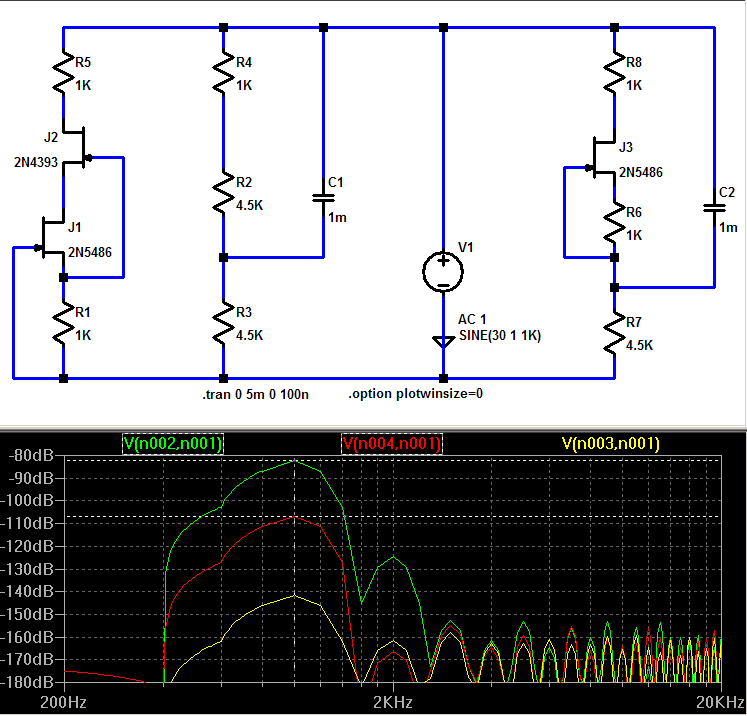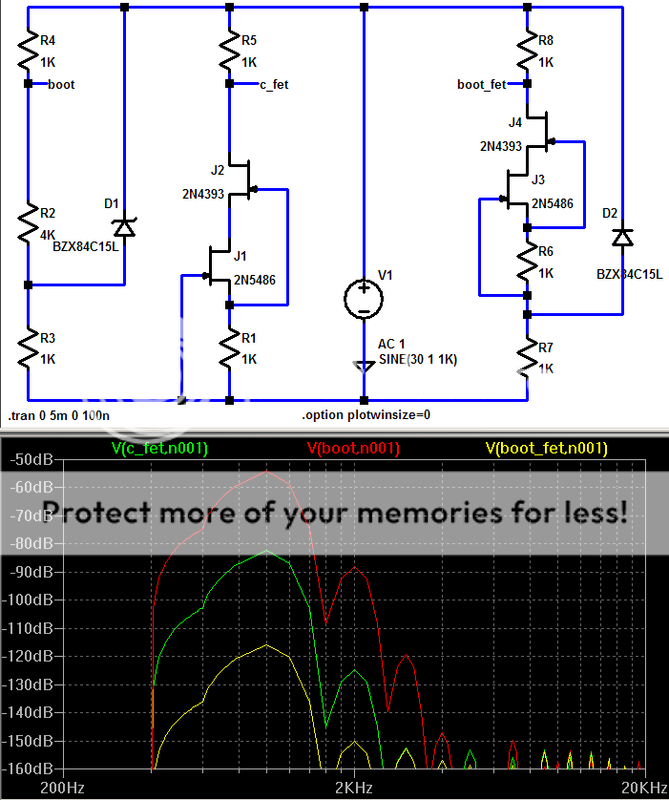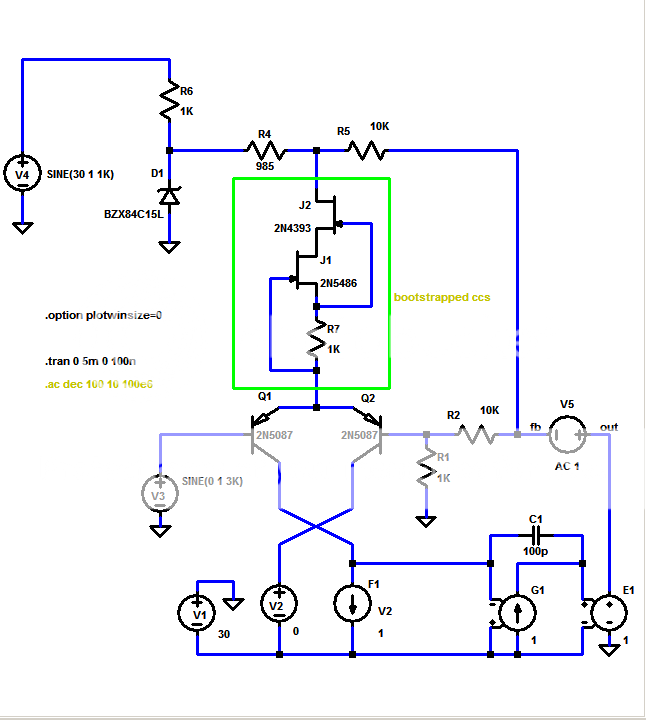I am looking for an "ideal" ccs, i attached a small collection of 9 different ccs circuits, all rated with a psrr. This db value is the voltage ripple visible at the 1k resistor with the power supply contaminated with 1v AC, all ccs giving ~3ma. The LED style is missing because i have no model...
Did i forget other / better circuits ? Right now the cascoded jfet-ccs seems to be the candidate. Number 9 is also very interesting as it is floating style like a single jfet-ccs.
What i want is a ccs with high psrr, but not too complicated.
Mike
Did i forget other / better circuits ? Right now the cascoded jfet-ccs seems to be the candidate. Number 9 is also very interesting as it is floating style like a single jfet-ccs.
What i want is a ccs with high psrr, but not too complicated.
Mike
Attachments
MikeB said:I am looking for an "ideal" ccs...
What i want is a ccs with high psrr, but not too complicated.
Those are somewhat at odds. I have read references on this forum and AA that Gary Pimm's hybrid CCS is the cat's meow, but it takes some effort to implement. His MOSFET CCS is again very well respected, but it is more complex than those circuits you listed.
If you search for CCS or constant current, you will find MANY threads.
As far as PSRR goes, Self presented some measurements indicating that adding a decoupling cap impoved the PSRR of several different CCS's to where they had about the same low figure. He claimed, but didn't present data tables, that a sufficiently large cap would drive the PSRR too low for him to measure. And below what any CCS achieved on it's own.
If this is valid, the choice would be to choose the CCS that gets you the best current stability then add the decoupling chain.
If this is valid, the choice would be to choose the CCS that gets you the best current stability then add the decoupling chain.
I forgot to mention, i want to have the psrr high down to very low frequency (practically DC). That's why none of the circuits has any cap.
I suspect PSRR at low frequencies to be responsible for proper reproduced dynamics.
Mike
I suspect PSRR at low frequencies to be responsible for proper reproduced dynamics.
Mike
You might consider an LM334. By itself it doesn't have a real good PSRR, but the data sheet shows a circuit with a FET and this should have excellent PSRR.
BTW, how can a cap improve the PSRR of a CCS?
BTW, how can a cap improve the PSRR of a CCS?
sawreyrw said:BTW, how can a cap improve the PSRR of a CCS?
By filtering the voltage supplied to the ccs...
Jcx, can you repeat sims using AC-sweep ? (maybe 0.01hz to 100khz)
I would love the left circuit if jfets wouldn't have that limited max voltage rating.
Mike
I posted this sometime ago, you might find it of interest
Constant Current Source article (Old)
Regards
James
Constant Current Source article (Old)
Regards
James
Attachments
Thanks jcx, out of words ? 
Boot_fet seems to be difficult to feed a diffamp as i can't easily bootstrap to the swinging emitters node, but cascoded jfet ccs seems to be really the king...
Mikeks, thanks, i really need to improve my searching skills...
Mike

Boot_fet seems to be difficult to feed a diffamp as i can't easily bootstrap to the swinging emitters node, but cascoded jfet ccs seems to be really the king...
Mikeks, thanks, i really need to improve my searching skills...
Mike
two pole CCS
Mike, here is an intresting CCS variation, might be worth investigating further: http://www.elektronik-kompendium.de/public/schaerer/curr2pol.htm
Mike, here is an intresting CCS variation, might be worth investigating further: http://www.elektronik-kompendium.de/public/schaerer/curr2pol.htm
Hi Martin, thanks for the link. I have a nearly identical version in my collection, except your r3/4. R3 is really interesting, there is a good chance that the ccs would keep closed at startup. I experimented with r4, but all kind of values only reduced quality ?
Mike
Mike
I made more sims, also adding the "self cascoding" jfet ccs. (see attachment)
The self cascoding shows an impressive -114db...
Than i ran a transient analysis to check stability of these circuits.
I quickly rejected the "self cascoding", it has ringing like hell, asking for problems. Also i rejected all circuits showing any ringing or beeing ugly slow, this left over 3 circuits, the zener referenced ones and the cascoded jfet.
Number 7 (the cascoded jfet) seems to be best option regarding psrr AND stability. (the most stable one)
2nd choice would be Number 3, simple but efficient and stable. Better than my favourite (until today), the No1....
Mike
The self cascoding shows an impressive -114db...
Than i ran a transient analysis to check stability of these circuits.
I quickly rejected the "self cascoding", it has ringing like hell, asking for problems. Also i rejected all circuits showing any ringing or beeing ugly slow, this left over 3 circuits, the zener referenced ones and the cascoded jfet.
Number 7 (the cascoded jfet) seems to be best option regarding psrr AND stability. (the most stable one)
2nd choice would be Number 3, simple but efficient and stable. Better than my favourite (until today), the No1....
Mike
Attachments
- Status
- Not open for further replies.
- Home
- Amplifiers
- Solid State
- Searching the "best" CCS





